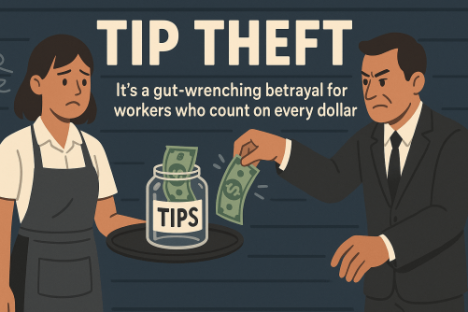Picture this: you’re a server in a bustling California diner, pouring your heart into making sure every customer leaves with a smile. The tips they leave are your lifeline, a reward for your hustle in a state where living costs can feel like a punch to the gut.
But then you find out your boss is skimming those tips or passing them to someone who didn’t lift a finger for them. That’s tip theft, and it’s a growing problem in California that’s got workers fed up and fighting back. California Business Lawyer & Corporate Lawyer has been a beacon for servers and bartenders battling tip theft, helping them face off against employer attorneys to get what’s rightfully theirs. This article dives into the messy world of tip theft, what it means for workers, and how folks are pushing for justice.
What Exactly Is Tip Theft?
Tip theft is when your boss or manager dips into the tips customers leave for you, whether it’s pocketing cash, tweaking credit card tips, or funneling them somewhere they don’t belong. It’s a gut-wrenching betrayal for workers who count on every dollar. The Nakase Law Firm, a Southern California attorney defending wage and hour class action defense, has seen firsthand how tip theft rips away earnings from hardworking servers. It shows up in a few sneaky ways:
- Straight-Up Stealing: Your boss grabs cash tips off the table or skims a chunk of your credit card tips before you see them.
- Tip Pool Trickery: They force you to split tips with managers or kitchen staff who aren’t supposed to get a cut.
- Wage Dodging: Using your tips to cover what they owe you in wages, which is a big no-no in California.
- Service Charge Shenanigans: Adding “service fees”; to bills that customers think are tips, but the business keeps them without telling anyone.
In California, where rent and groceries eat up so much of your paycheck, these tactics hit hard. Tipped workers aren’t just losing pocket changeâthey’re losing the ability to pay their bills.
The Law’s Got Your Back (Mostly)
California’s got some of the toughest rules to protect tipped workers, and they’re crystal clear: tips are yours, not your boss’s. California Labor Code Section 351 says employers can’t touch tips, whether they’re cash or card. Here’s the lowdown:
- No Tip Credit Nonsense: Some states let bosses pay less than minimum wage and use tips to make up the difference. Not in California. Employers have to pay at least $16 an hour (more in places like San Francisco or LA) before you even touch a tip.
- Tip Pooling Done Right: Sharing tips with coworkers like bussers or hosts is fine, but only if it’s voluntary and sticks to folks who directly serve customers. Managers and owners? They’re out of the pool.
- Service Charges Gotta Be Honest: If a restaurant slaps a service charge on the bill, they have to spell out whether it goes to workers. If it’s not a tip, they can’t pretend it is.
If your boss breaks these rules, they could owe you back pay, fines, or more. The California Division of Labor Standards Enforcement (DLSE) is the place to go if you’re ready to call them out.
Stories from the Trenches
Tip theft isn’t just a theoryâit’s real, and it’s messy. Back in 2023, a trendy LA restaurant chain got slapped with a lawsuit when servers figured out managers were taking 20% of their credit card tips to “cover costs.”; The workers, backed by a fierce legal team, won a $1.2 million settlement, putting money back in their pockets.
Then there’s the San Francisco coffee shop drama. Baristas found out their tips were going to shift supervisors who had no right to them. They took to X, spilling the tea and rallying support. The DLSE stepped in, and the shop had to cough up $300,000 in stolen tips. These stories show how tip theft sneaks into all kinds of places, from fancy spots to corner cafes. And with digital payments, it’s easier for shady employers to fudge the numbers, leaving workers scrambling to keep track.
How It Hurts Workers
Losing tips isn’t just about a smaller paycheckâit’s a gut punch. In California, where a one-bedroom apartment can cost more than your monthly take-home, every tip counts. When your boss steals them, you’re left stressing about rent, groceries, or daycare. It’s exhausting, and it makes you feel like your hard work doesn’t matter.
It’s not just about money, either. When tips get snatched or handed to someone who didn’t earn them, it kills the vibe at work. You’re busting your tail for customers, but the reward’s gone. That resentment can make you dread your shift or even quit the industry. And let’s be real: tip theft hits hardest for folks already strugglingâwomen, people of color, immigrantsâwho make up a huge chunk of the service world. They might not speak up, scared of losing their job or not knowing their rights.
Fighting Back: What You Can Do
If you think your tips are being messed with, don’t just sit thereâdo something. Here’s how to start:
- Keep Receipts: Track your tips like a hawk. Save cash tip records, credit card slips, and pay stubs. If something’s off, you’ll have proof.
- Check the Rules: Ask your boss for their tip policy in writing. Then see if it lines up with California’s laws.
- Call the DLSE: File a wage claim with the DLSE online or at their office. They’ll dig into it and can make your boss pay up.
- Get a Lawyer: If it’s a big deal or involves a bunch of coworkers, talk to a labor attorney. Lots of them give free consults and only get paid if you win.
- Team Up: Talk to your coworkers. If you all raise a stink together, it’s harder for your boss to ignore you. Maybe even get the media or X involved to turn up the heat.
And don’t worry about getting fired for speaking upâCalifornia law says your boss can’t retaliate for reporting wage theft.
What Good Employers Should Do
If you’re running a restaurant, don’t be that boss. Be upfront about how tips workâtell your workers and customers. Pay out tips fast and fair, and steer clear of service charges that confuse folks. Check your payroll system regularly to catch mistakes. Train your managers on the law so they don’t accidentally (or not so accidentally) screw things up. And let your workers speak up without fearâthey’ll respect you more for it.
Customers Can Help, Too
You, the customer, have power here. Tip in cash if you canâit goes straight to your server, no middleman. If something smells fishy, like a weird service charge, ask questions. And if you think a place is shady, tell the DLSE or shout it out on X. Better yet, support spots that treat their workers right. Your dollars can push the industry to do better.
Where Do We Go from Here?
Tip theft is a stubborn problem, but California’s laws and fired-up workers are making a dent. With every lawsuit and social media storm, shady employers are feeling the heat. Still, the bigger issueâlow wages and depending on tips to surviveâmeans we need more than just lawsuits. Maybe it’s time for a bigger conversation about fair pay for everyone in the service game.
For now, if you’re a tipped worker in California, know this: the law’s on your side. Keep track of your tips, speak up when something’s wrong, and don’t be afraid to fight for what you’ve earned. You’re not just serving tablesâyou’re standing up for what’s right.






